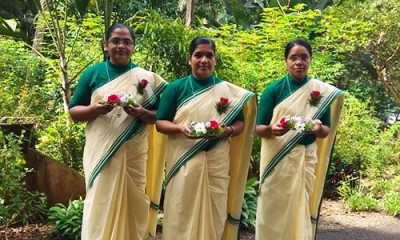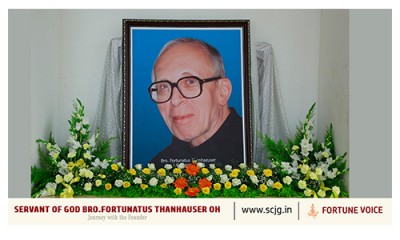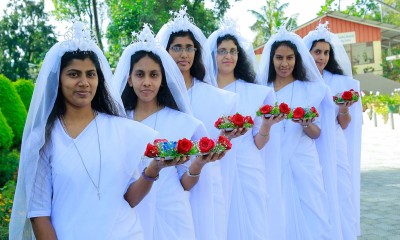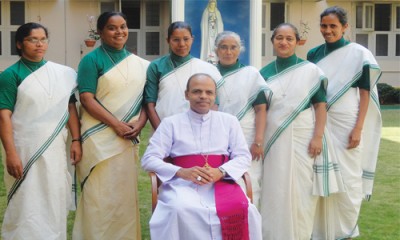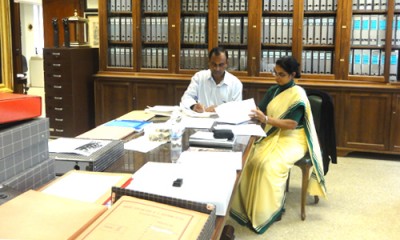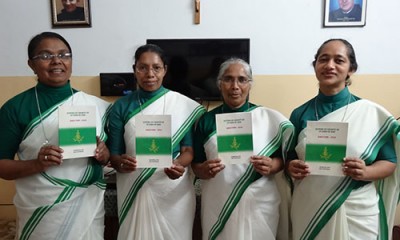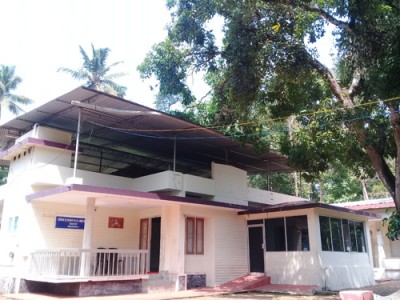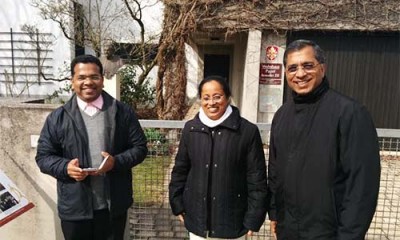Biography
Our Founder Bro.Fortunatus
Bro. Fortunatus Thanhauser was born in Berlin ( Germany) on 27 February 1918 and entered the Hospitaller Order of St.John of God on 27 May 1935. In his life he experienced a meeting with the merciful Jesus and he discovered his Vocation to serve the sick, the homeless and the needy. This brought him to India, in 1969, where he initiated the beginning of the Hospitaller Order of St.John of God in the southern state of India, Kerala at Kattappana. With a true and solid love he founded hospitals and houses of welcome for the moribund and for needy children. The life of Bro. Fortunatus was always oriented to the welfare and salvation of all he met, especially the most needy. The spirit of fortitude, adventure, renunciation, love, self-giving and total consecration to God are found in this great man who paved the way
Bro. Fortunatus, the father of the poor, was called by God for his eternal reward on 21 November 2005.
Bro. Fortunatus. (1918 - 2005)
- The great lover of God
- The neighbor for whom every sick person was Christ, every sick bed the Alter and the sick room chapel.
- The founder and inspirer of the Hospitaller order of St.John of God Brothers.
- The founder and father of the congregation of sisters of Charity of St.John of God.
- The beginner of many projects and programs including Housing Scheme, Pratheeksha Bhavan (home for the aged and chronically sick orphans), Mother and Child Health Programme, Financial Assistance for the poor, Sponsorship for Education, Medicine for the poor patients, Poor Feeding (Mid-day meals for the poor), Goat project, Cloth distribution, etc.
- The founder of St. John's Hospital and Nursing schools.
- Born as a German in Berlin and died as an Indian at Kattappana in Kerala.
- 'Valliyachan' of the high range people of Idukki District.
Biography - General introduction
-
Two eminent German missionaries who lived, worked, died and were buried in Kerala are Arnose Pathiri alias Johann Ernst Hanxleden SJ and Brother Fortunatus Thanhauser OH. Arnose Pathiri lived and worked in Kerala in the beginning of the 18th century (1700-1742) and Brother Fortunatus in the last decades of the 20th century (1969-2005) with a gap of two and a half centuries. Arnose Pathiri was a scholar missionary: Fortunatus Thanhauser a humanitarian missionary; the former is known as an Indologist the latter has recently been called a ‘Servant of God’. Arnose Pathiri belonged to the largest and well-known religious Congregation of Society of Jesus (SJ) and Brother Fortunatus is a member of the ancient widely known Hospitaller Order of St. John of God (OH). Arnose Pathiri lived and worked centering Trichur: Fortunatus Thanhauser worked in the High-Ranges centering Kattapana. Arnose Pathiri is known more in the field of languages, Fortunatus Thanhauser in the medical and social fields. For both Kerala was their second home-land [Zweite Heimat]. Syro-Malabar Church is grateful to both these two great personalities of German origin who by lives and deeds became Malayalees.
Fortunatus Thanhauser is a missionary par excellence. He is an archetype of an ideal missionary due to various reasons. Even before the selection of the mission land, i.e. India, he gained a rather good knowledge of the land and the people. After having reached the land he tried first of all to learn the history of the region and the customs of the people. His expression ‘If mission then India, if India then now or never’ is very meaningful and impressive. He started with the construction of a hospital at Kattapana as there was no medical facility within a radius of 110 kilometers. The Hospitaller Brothers’ focus is always on providing medical facilities. The felt-need of the people in the High-Ranges was not overlooked by this great missionary.
Fortunatus Thanhauser did not confine himself to the medical field. His attention turned to other realms as well. He built a home for the poor and a then separate section for the chronic patients. Construction of houses for the homeless, supplying food for the poor, supplying sewing machines and goats as means of livelihood etc. were other projects. There were programmes to help the school going children by providing them with school books, clothes, milk-powder etc. He started a branch of the Hospitaller Order in Kattapana which in 2005 became a province with six houses and various hospitals. In 1977 he founded a Congregation for the sisters called ‘Sisters of Charity of St. John of God’ (SCJG) which today has 89 sisters working in different dioceses in Kerala and in North India and abroad.
Many are the epithets given to Brother Fortunatus. He is a religious, a missionary, a humanitarian, a social reformer, a friend of the poor and a father to all. All these are not mere titles but he deserves all these qualifications. He is known more for his compassion towards the poor, the sick and the downtrodden. ‘Do good to others’ was his motto. The Italian name of the Hospitaller Order Fate bene Fratelli and the German name Barmherzige Brueder mean the same. ‘The best way to make others happy is to do something good to them. By making others one can become happy’ was his life-guiding principle. That is the reason why the Order to which he belonged upholds hospitality as their hallmark. More than that, he was a man of compassion. He was very considerate to all, especially to the poor and the sick as he found Christ in them all. So he tried to give them always the best possible help or treatment. So he has a place in Kerala history and he stands as an icon of mercy.
Bernard Thanhauser born in the capital city of Berlin, from the age of two was brought up in the village of Volpersdorf in Silesia, which after the World War became part of Poland. His life in the Forest-house in the middle of the forest – as his father was the forest officer – created in him love of nature, respect towards the living beings and an attitude of simplicity and hard work. So his later life in Kattapana, Kerala, was for him joyful and peaceful. We find him often comparing Kattapana and Volpersdorf. Some flowers, trees etc. in Kattapana and the simple ways of life all reminded him of his early years in Volpersdorf. So he felt at home in Kerala.
His life in Breslau as a Hospitaller Brother from 1935 till 1950 was exemplary and inspiring. There he learnt the art of healing the sick and the joy of serving the poor. He did marvellous service in the Breslau hospital during the World War II in nursing the wounded soldiers and the civilians. But the loss of his mother and the two brothers during this period was really painful to him. From 1950 he had a new-start in the war-torn Frankfurt. So much pain and energy he spent there to bring back ‘life’ to this metropolis of Germany. All his efforts there bore much fruit. He could not only raise the Frankfurt hospital to the status of a standard hospital but he could also found hospitals in Falkenstein and Duttenstein. During this time he served the Order as the novice-master and vice-provincial.
He found everything as a gift of God; the success and failures, the gains and the loss. The failure or loss he found to be the step towards success. His deep faith and profound trust in God enabled him to be fully at the service of others. Serving the poor and the lowly he found to be more pleasing to God as they belong to God alone. So he thought of starting a mission in India. ‘If mission then India, if India then now or never’ (as he expressed in a letter from Kattapana in February 1971) is a very meaningful slogan. ‘A real missionary is a true religious’ was his idea. This was the motivating force behind all his activities in Kerala.
He was a very successful missionary in India. No sphere of activity in the mission was foreign to him. He started a hospital, home for the chronic patients and a home of shelter for the aged and the abandoned and a number of other social reform measures. He was in the real sense a social reformer in the High-Ranges. The development of modern Kattapana was on a par with the growth of St. John’s hospital. From a simple dispensary in 1970 the hospital has grown up to the stature of a modern hospital with almost all departments and 450 beds in 2016; Kattapana from a simple village to the status of a municipality recently. To the people in and around Kattapana he was a loving brother to the needy and a father to all. His love and concern, his ways of life and his approach and his various activities to raise them up from their backward surroundings made him a humanitarian. So he could be rightly called a man of compassion. At the same time he was a man of contemplation who placed full trust in God.
The mission house of the Hospitaller Order started by Fortunatus in 1969, assisted by Brother Prakash Madapally, became a province of the same Order in 2005. Today the Indian Province of the Hospitaller Order with headquarters at Chennai has 49 members, 9 houses and 16 institutions consisting of 3 hospitals, 1 Nursing College, 1 College of Para-medical Sciences and Research Centre, 1 Pharmacy Research Centre, 1 College of Special Education, 1 School for the Differently-abled, 4 Old-age Homes, 1 Hostel for Mentally Retarded Girls, 2 Long-stay Homes for Mentally Retarded, 1 Heath Centre and 1 HIV Centre. The congregation of sisters started by Brother Fortunatus called Sisters of Charity of St. John of God has now 89 members, 11 Houses and 7 Residential houses in and outside India and a number of institutions like 3 Old-age Homes, 1 Shelter Home, 1 Nursery School, 1 Dispensary, 1 Women’s Hostel, 1 Hostel for Girls, 1 House for Mentally Challenged Girls and 1 House for the Singles. He died on 21 November 2007 and was buried on 26 at St. John’s Hospital Kattapana. ‘Valliyachan’ – so was popularly called – still lives in the minds of people. So soon after the death and burial people were coming to his tomb seeking his intercession. Many are getting favours. So in November 2014, in the 10th year of his death he was declared a Servant of God and started working the diocesan commissions for the cause of the canonization of servant of God Brother Fortunatus Thanhauser. We hope and pray that he be declared a saint by the church in the near future and his life would inspire many to turn to God and praise Him.
Chapter I
School Days at Volpersdorf [Woliborz] (1920-1935)
1. Introduction
Bernard Thanh?user was born in 1918 in Berlin, in the capital city of Germany, at a time when the country was facing the difficulties and the atrocities of the World War I and from the age of two he was brought up in the village of Volpersdorf, in the region of Silesia. As his father was a forest officer Bernard had the chance to live in the forest house in the middle of the Volpersdorf forest in the district of Glatz. His life in the forest house was very calm, simple and beautiful and was not affected much by the post-war troubles. His father Ewald was much committed in his work as a forester. This must have influenced Bernard to form an attitude of love for nature and respect towards the plants, trees, animals and the human beings. His mother too was a model to him as she was very considerate towards the needy around. During his life in the Volpersdorf forest-house he could also enjoy the affection and concern of his two younger brothers. He maintained good contacts with the neighbouring families, his classmates and teachers.
2. Birth in Berlin
Bernard - his full name is Hubertus Ludwig Adalbert Joseph Bernard Thanh?user - was born on 27 February 1918, the last year of the World War I, in Friedenau, the hometown of his mother, a suburban of Berlin, the capital city of Germany. His parents were Ewald and Maria-Charlotte. Ewald Thanh?user (1879-1954) was a forest officer (Rivierförster) and Maria-Charlotte, though trained a Telephonist, was a housewife. But after two years, in 1920, the family of Bernard had to move to Silesia. Silesia, though today a part of Poland, at that time was part of Germany. Regarding the same he writes:
I was born in the war-stricken Berlin. Though I am a Berliner by birth, my roots are in Silesia. But my mother, on the contrary, is a Berliner who became a Silesianerin by her marriage with a forester in 1914. Thus I grew up in Silesia in a forest house in the middle of a forest.
He was the eldest of the three sons of Thanh?user family; his younger brothers were Joachim and Hubert. In a letter written in February 1972 Brother Fortunatus writes regarding his birth and growth: “I was born as the eldest of 3 brothers in Berlin, 1918. My father had been a forest officer in East Germany. So I grew up in the forest, I had a long way to the church and to the school.
Birth certificate
Of maria-Charlotte
Map of Berlin- Friednau
Bernard was baptized in St. Mathias Church in Berlin-Schöneberg, the parish church of his mother on 3April 1918.
Baptism certificate
3. Moves to the forest house in Volpersdorf in the district of Glatz in Lower Silesia
His mother, Maria-Charlotte Beschorner – her full name was Maria Anna Bertha Charlotte Beschorner - a Berlinerin became a Silesianerin is by her marriage. She was born in Berlin- Schöneberg and lived there till the age of 30. Her father was a councillor in the military in Berlin. But he was originally from Silesia in the district of Glatz. She had good contact and experience in Silesia as her father was from Silesia. She often visited her aunt in Kieslingswalde in Silesia, who had been married to a Saegewerkbesitzer [owner of a sawmill] in Silesia. Ewald Thanh?user, who was working that time as an assistant-forester in the Grafschaft (district) Glatz
in Lower Silesia (Nieder Schlesien) lived as a guest in their house.
This led later Ewald to marry Maria-Charlotte, who was often a guest to her aunt in that house in the forest in Glatz in Silesia. The marriage took place in December 1914 in the Minoriten Church in Glatz.
Photo of parents and the forest house, map of Silesia
Soon after the marriage in 1914, as the World War I broke out, Ewald joined the army. At the close of the war, in 1920 after his return from war, Ewald chose the job of a forester in Silesia as his father too had been a forester in Gross-Wartenberg in Lower Silesia. Thus the young Bernard from the age of two had his childhood in Volperdorfer forest in Silesia. Brother Fortunatus admired the job of his father saying that his grandfather too was a forester. So he writes in Erinnerungen an ein erfülltes Leben that through his veins flows Silesian blood.
4. Political situation of Germany after the World War I
The time when Bernard was born (1918) and the when the Thanh?user family moved to Silesia (1920) was a very difficult time in Germany. The aftermath of World War I saw drastic political, cultural and social changes across Europe, Asia, Africa and even in the areas outside those that were directly involved. Four empires collapsed due to the war, old nations were abolished, new ones were formed, boundaries were redrawn, international organizations were established and many new and old ideologies took a firm hold in people's minds. World War I also had the effect of bringing political transformation to Germany and the United Kingdom by bringing near-universal suffrage to these two European powers, turning them into mass electoral democracies for the first time in history.
Through the period from the armistice on 11 November 1918 until the signing of the peace treaty with Germany on 28 June 1919, the Allies maintained the naval blockade of Germany that had begun during the war. As Germany was dependent on imports, it is estimated that 523,000 civilians lost their lives. A further quarter of a million more died from disease or starvation in the eight-month period following the conclusion of the conflict. The terms of the armistice did allow food to be shipped into Germany, but the Allies required that Germany provide the means (the shipping) to do so. The German government was required to use its gold reserves, being unable to secure a loan from the United States.
An Allied task force, to help feed the German population, was established in early 1919 and that by May 1919 Germany became the chief recipient of American and Allied food shipments. During the early months of 1919, while the main relief effort was being planned, France provided food shipments to Bavaria and the Rhineland. The very success of the relief effort had in effect deprived the Allies of a credible threat to induce Germany to sign the Treaty of Versailles. For eight months following the end of hostilities, the blockade was continually in place, with some estimates that a further 100,000 casualties among German civilians to starvation were caused.
After the Paris Peace Conference of 1919, the signing of the Treaty of Versailles on 28 June 1919, between Germany on the one side and France, Italy, Britain and minor allied powers on the other, officially ended war between those countries. Included in the 440 articles of the Treaty of Versailles were the demands that Germany officially accepts responsibility for starting the war and pay economic reparations.
5. Life at Volpersdorf
In Volpersdorf the Thanh?user family lived in a forest house. Since this was the house of the forester it was in the middle of the forest. It was the duty of the forester to look after the whole forest. The nearest houses were almost 4 km away, near the Volpersdorf church. From the Volpersdorf Chief Forest Ranger’s house one could see far into the countryside. The road in front of the house led to the railway station towards the forest region. The houses in Volperdorf were all small and cute and in front of each house grazed the goats. In the evening people used to sit on the benches in front of the houses listening to the music or listening to the accordion. Near the road from the forester’s house lay the brewer’s pond and the catfish hatchery. In the summer the brewer’s pond was used as the bathing pond, but only for the swimmers because it was very deep.
The post-war time in Germany was very pathetic. People were struggling hard to make both ends meet. The situation in the cities was worse than that in the villages. In the post-war time there was high inflation in Germany and it was very difficult to buy anything using currency. Bernard describes one such incident. He writes:
I became aware of the 1923 inflation by the following incident: During this period I received a currency note from somebody, for buying sweets – an unusual experience for me – I still remember, that the currency had a number. At that time of my childhood I did not know the implications of the numbers except those of the zeroes. I did get nothing for it, except one sweet. The sweet was certainly not for the value of the money, but for the pity the merchant Nitsche felt for me. Then I understood that these zeroes had a meaning in themselves. Moreover, I realized that money did not have any value during the inflation.
Their neighbour in Volpersdorf was the mineworker Bauch. Mr. Bauch earned his livelihood working in the mine, as many others did in the locality at that time. The Bauchs had twelve children and they were all leading a very frugal life. Bernard and the Thanh?user family had very good contact with this family. That is the reason why when Brother Fortunatus was recalling his childhood days wrote that the Bauchs had thirteen children and he (Bernard) was the 13th. The following lines show how simple was the life in the Volpersdorf forest house and how he felt himself one among the 13 Bauchs:
In the morning the steaming potatoes were piled on the table, and each everyone took a pinch of lard well dipped in salt along with it. To me it tasted much better than the butter at home. Only when all had eaten enough potatoes, frugally broken pieces of bread in thin hot milk were served.
6. Begins the schooldays
During Easter time in 1924 Bernard was taken to the school. His primary education was in the Volksschule (primary school) in Volpersdorf. While going to the school he was also taking his younger brother to the play school. In the autumn of 1924 the family moved in the old Ranger’s house in the forest at the street to Volpersdorf Plane with the Customs House in front of it. From 1920 till 1924 they lived in Oberdorf in the district of Glatz in Silesia.
With this transfer of residence from Oberdorf to Volpersdorfer Pl?nel the school way had become a good stretch longer.
As the Ranger’s House was an old building, hardly inhabited for a long time, it had to be renovated. One estimated its age at that time at 200 years. The forester Faltin was the former resident of this house. His father, himself a forester, had built the road and therefore this road is named after him as Faltinweg. Those days the forester himself had to take care of the construction of the roads, so that the accruing timber could be transported for the road construction, the trolleys, which ran over rails, stood characteristically ready to transport earth, stones and gravels. The secondary school (pre-gymnasium) studies were in Neurode
from 1929 to 1935.
Pre-gymnasium certificate
7. Memories of his parents
Brother Fortunatus felt that the country forest had its special charms. There were the dark needle forests, in which hardly any sunbeam could penetrate. His father Ewald was a lover of forests. As a forester he had also the duty or privilege to do hunting. Brother Fortunatus writes about his father:
He (Ewald) did not want to shoot at all into the peaceful landscape. He was more a gamekeeper than a hunter; the hunting belonged necessarily to that. Over the entrance to his office room, there hanged a board relating to nature and forest: ‘the forest is a blessing, where God created it; to preserve the forest, a finer profession’.
According to Bernard, his father Ewald is often found in the garden or in the forest and rarely in the workroom. Brother Fortunatus writes more about his father’s love of nature:
If there were no timber measurements, or if it was not a pay day, he had rarely been seen in his workroom. One could meet him either in the forest, or with certainty at the plant garden, a nursery for the breeding of wild trees on an area of two acres of land. The plant garden was also in itself his hobby. The neighbouring forestry was also provided with seedlings from this nursery. There were also rare varieties of trees grown for purposes of experiment. There were occasional conducted tours through the nursery for the interested visitors.
Sheep were reared at forester’s house for milk. Also a strong ram was kept at home to draw the children to school. But the ram was of not much use. Therefore its place was taken by a white horse which was a ‘good –natured’ horse which took the whole family on Sundays to church and back. But it never took the children to school. The dog called ‘Senta’ was used for hunting.
That time only the forest administration and the doctor in Volpersdorf owned cars. The radios also started getting popular. As the Forester’s house was out of the way, the postman did not come there. Therefore the boys themselves had to fetch them which they were doing after the school. Brother Fortunatus writes: “always we went willingly to the post, because we got not only the mail, but also something else with it, some sweets, fruits or cake”.
Fortunatus writes about the great role of a godmother at that time. According to him, she was often drawn into the family for consultations; and on Maundy Thursday it was the custom to give presents to her godchildren. There existed a deep spiritual relationship which seemed to be deeply anchored. Thus for the three boys Bernard, Joachim and Hubert forest was their world and the trees, the birds and the animals their friends. This gave them a very good experience with nature and the land.
In Bernard’s opinion to wail over the cold or such matters is never his father’s concern because he was against every sort of pampering, as he called it. He had never used gloves except wristlets, nor ear protector. For that he drew the cap lower and never used a shawl. As he came out of the forest in very heavy snow, icicles clung on his moustache, which he had first to thaw. He called umbrella unworthy of a forester [einen Schirm nannte er eines Forstmannes unwürdig] . He writes:
He was a thorough forester. It was in his blood; because his father was a forester and his grandfather also. Presumably two of his sons wanted to become foresters. Our maternal grandfather hailing from an old middle forest family, a forester by profession, was however a member in the Kaiser’s military cabinet after his military service in Berlin. In any case our family was coloured in green. Only I was the black sheep in the family, and that too in a double consideration. But, what was called a negative formation in the beginning, has been valued later as positive.
As his father, the mother too influenced Bernard much. He was often recollecting the love and care of his mother. One thing he had to say is that his mother was always happy, even amidst difficulties and unfriendly situations. Another quality he finds in his mother was that she was always ready to help others. He narrates in Kinderjahre in der Volpersdorfer Forsterei some such occasions. He has found many a time her going to the house of others to give them what they needed. He is of the idea that this quality of her mother might be the motivating force behind his choosing the Hospitaller Order. He writes that his mother could hardly resist against the gypsy women; they always were after her to predict the future. She preferred to give them what they had requested; but they would not accept it for nothing as the women emphasized again and again. For whatever they got, they just wanted to predict the future.
The interbellum [time between the two world wars] was a very difficult time in Germany, especially 1930s. That was the time when Nazis were coming up and they were a threat to the church and religious beliefs. Very few dared to join Religious Orders or dioceses as the politics was against such a life. However, his mother, as he writes, not only was his mother not against him joining the Order but encouraged him and gave him support and strength.
People often came to the Ranger’s house, sometimes even from very faraway places. They wanted badger fat (Schmalz), which they needed for medicinal purposes – as a healing medium for treating seriously ill persons for bed sore and for healing longstanding wounds. The beautifully painted skins of black or dark gray or light gray badgers with white hairs however adorned the floors of the Rangers’ houses as decorative mats.
However, animal protection and hunting did not only bring pleasant things with it. During the middle of the twenties there was increasing unemployment in Germany and industrial workers appeared from Langenbielau in the plains at Volpesdorf Plaenel frequently. They had been cutting the valuable trees vigorously, and had directly transported them after the motto: ‘the forest is there for all’. Ewald had also admitted it. However, he did not mean it in the same way. He then went together with the constable at the Pl?nel before dawn in order to intercept the far too early wood-cutters right from the start until the nuisance was stopped. Sometimes the constable also accompanied gypsy clans as far as to the Pl?nel.
8. About the first confession
The time of the first confession was an unforgettable incident in the life of Bernard. He writes that that was in the early spring on a sunny day. The people were in the village busy with the ‘cleaning of the areas’ and processed the lawn in the gardens and meadows with rakes and brooms. He writes more about the same:
At home, I didn’t help in this work gladly; however on this day I had done this only far too gladly. Anyway more gladly than to go for confession. I wish that I would be already on the way back. At the school, I ran into the priest in his way. I just had missed this, I thought, now the interrogation would start, whether I have really prepared and nothing had been forgotten etc.
He had very good memory of his first confession. As it was a very important event in his early years he was always joyously thinking of it. He writes further:
But nothing of whatever he had asked me had been inconsequential. The priest admittedly had given the confessional instruction, but he had been always speaking about the confessional priest and not about himself. In the end, he was not at all this confessional priest; maybe there was someone like the church father as confessor, because there was something like that also. My neighbour in the church whispered nervously to me, that he had forgotten his confessional paper at home and what he should do now. I was really sorry about it, but confessional papers I think nobody can lend him. That is really not possible. It must have finally worked out somehow; because afterwards we went home together completely happy.
9. First holy communion on 29 June 1929
Brother Fortunatus kept in mind always the good memories of the first communion. The first communion took place in the Holy Cross Church in Neurode [Nowa Ruda]. He writes about his first communion in the following way:
The Holy Cross Church was situated in an odd place, lay directly alongside the street, it hardly had a front yard and was built into a steep hillside. Its interior was cozy. The big cross was conspicuously fixed over the high altar; the crucified body of Christ had long natural hair that swirled when a stream of air entered the church. Here the celebration took place. It was followed by an obligatory photograph on the Stillfried Road before sceneries, that the Holy Cross church admittedly did not present, on the contrary a fantasy cathedral with huge columns.
About the celebrations which followed were also impressive and he had fresh memory of the same. He writes further:
The lunch was served in Neurode in hotel Wildenhof am Ring this time; father knew the owner. What was given there to eat, is forgotten long ago; but that which was not forgotten was, that there were new potatoes, admittedly still rather small, but just ‘new’ – this should mean something at that time – on the 29th of June new potatoes, because in Volpersdorf potatoes were not yet harvested. The valedictory celebration took place in the afternoon in the chapel on the Annaberg. Afterwards, we still wanted to look around in the area, but father pressed for the return trip. He was always in a hurry. Relatives used to say occasionally as a joke that he was afraid that the trees would run away in his absence.
10. The school days
In 1929 after having completed the primary school in Volpersdorf parish church school Bernard went to Neurode for pre-gymnasium. As it was 8 km away from Volpersdorf he was going everyday on bicycle. But in unfriendly weather he was not using the bicycle. On such occasions he used to remain with a friend’s family in Neurode, called Bergmann. He also felt comfortable with them. Bernard’s mother and Mrs. Hedwig Bergmann were good friends. In a letter dated 10 December 1979 Fortunatus Thanh?user writes that he could learn a lot from this good family during his stay there. As he writes, the life with them helped him much to learn a lot of things for the future.
Like any other boy Bernard also was sometimes reluctant to go to school on special occasions. But whether in winter or summer he was going to school with his friends. His best friend, as he writes, was Alfred Steiner, with whom later he always maintained good contact. Due to high snow when there was no class was a beautiful experience. The pig slaughter always had to take place in the winter months for lack of cooling facilities. It had become so slowly a custom that the children did not go to school on that day. It was a party, a slaughter party, according to him. Finally a strict school ordinance came that pig slaughter is no excuse to be absent from the school. Therefore one had to go to school with a heavy heart while one missed the important things at home.
Brother Fortunatus always had a fresh memory of his English teacher. In the third year of the Grammar school he started learning English. As the English teacher was using only English in the English class it was at first difficult for the students to follow. But, as he writes, gradually they overcame the difficulties. The English teacher was a well trained one, who had her special studies in English from England. He appreciates also his German teacher. He writes that she was always lamenting the bad handwriting and the insufficient orthography. She was not at all content with the syntax and used a lot of red ink for the correction of the notebooks. He writes that he often admired her for her enthusiasm in teaching the poems and the poets. He kept in his memory certain incidents and humorous expressions of his secondary school days, especially connected with the teachers of geography, history, biology and arithmetic.
11. Certain unforgettable events during school years
According to him the family hardly went on tours. Once on a Sunday, they went by the horse cab to the Ranger in Koenigwalde; they were his relatives. Then they went for a pilgrimage to Wartha. First they reached Albendorf and from there on foot to Wartha through the forest. He writes:
It was still completely dark when started, and we went always along the tracks of the owl and then through forests and fields. Even though we could keep pace with father in the beginning, he was always ahead of us by least half a kilometer, and the rest of the family could not keep up with his pace. The longer the way, the more frequently we had to take rest. Sometimes we had also lost our way, because as we saw the towers of the pilgrimage church in the distance, the church bells rang for the midday. Of course, the services of Holy Mass had already been over long ago.
They then came back by train after first visiting the railway tunnel. Here his father had his first deployment as a soldier in the World War I for guarding the railway tunnel. Here the mother visited him as his future wife as he was to be transported to Russia afterwards. Therefore, they married at a short notice without any celebration as a wedding during the war in the Minoriten Church in Glatz, as the then garrison church. Every time when they went to Glatz, a visit to the Minoriten church was also a must.
Brother Fortunatus in his autobiography jots down one interesting event during his school years. That is an event related with an accusation of stealing of apples. He was once accused of having stolen apples along with another boy. They found some apples lying on the wayside. As those apples were not too spoiled they lifted them and ate them. However, a girl saw them and lodged a complaint against them in the school. They had to come to the front and were questioned and everyone got three blows each on the palm. Fortunatus writes that that was not so bad, but to stand there as a thief was worse. With due respect he told the teacher that the apple would not have been picked by anyone else and they would have become bad! In reply he said: “it is better that this apple becomes bad, than that you become bad’. “What reply can you make to that?”
He recounts another interesting incident of the school days. It so happened:
In the school, girls and boys sat strictly separated from each other. But sometimes it so happened that a young boy had to sit down on the side where girls were sitting as a penalty and that too at short notice; and it could happen the other way also. But this happened only very rarely. Anyway, once a girl sat before Bernard. In order not to crumple her long plaits with the beautiful bows, she spread these on his desk at the back, because the backrest of the front seat was also the desk for the rear man at the same time. Every time she moved her head - and it happened very often – the plaits swept on his desk back and forth; and if he was not careful, the plait ends brushed him on the face. This was of course not all comfortable for him. But he could not say anything, because it was instruction time; however he didn’t want to leave it like that any longer either.
To bring the matter to a close, he took the plaits in his hand and pulled them powerfully, once to the right and once to the left, so that she should notice this. She noticed this, but the teacher also noticed it. He adds: “Now, I also got it, a beating – once on the right and once on the left with a smack in the face. Much too big a price to pay, but the plaits were gone”. This incident shows the character of Brother Fortunatus. He had no ill-feeling towards anybody and he had always a positive approach towards everything. This attitude is very evident in his later life. When he was in the war-affected Breslau or in the war-torn Frankfurt or amidst the difficulties in Kattapana he had no complaints of anything or of anybody.
Give photo
Parish church and the school at Volperdorf
12. Contacts with the neighbours
Bernard and his family had always very good relationship with their neighbours. As he writes the people in Volpersdorf were good. But following the World War II Volpersdorf was no more a German village, but a Polish village. Consequently all the Germans were forced to leave the place. Most of the families found refuge in West Germany. Still many families continued contacts. From the later letters of Brother Fortunatus we get the names of certain families with whom he could maintain contacts. One among them was the Bauch family. His contact with this family was so deep and that is why he once wrote that he was like the 13th child in Bauch’s house, their immediate neighbour. But after joining the Order and especially after the World War II there was no more contact with that family.
Another family with whom he had good contact was Steiner who lived in the same village. His mother and ‘mother Steiner’ [Steiner Mutter] were good friends and they helped each other. When Bernard’s mother died in 1945, Steiner Mutter was to him like his mother. Anna, August and Alfred were the children in that family. Bernard was going to school with Alfred. Anna was married to Grolms. After the war they too had to leave Volpersdorf. Even after becoming a religious, Fortunatus continued good contact with this family. When he was in Frankfurt in the post-war time this family lost everything and he was consoling them through his letters
. Through these letters we find them keeping fresh memories of Volpersdorf. In a letter to Anna Grolms dated 20 December 1963 Brother Fortunatus writes: ‘Thanh?user Familie ist ausgestorben’ [Thanh?user family is no more].
He then sent the old photos of Volpersdorf to the same family. During the period 1950 -1969 we find him writing almost every year to Anna Grolms wishing her on her Birthday. When he was in Kattapana also he was writing to this family until her death in 1979. Her husband Heinrich too died soon. Brother Fortunatus had good contacts also with her two sons Manfred and Bernard and the daughter Susanne married to Wilfried Gründel. Once Brother Fortunatus wrote to the Grolms family telling that if you would like to help the poor there was good opportunity in the Indian mission; but think of your children and grand children first. However, this family helped the Indian Mission on many occasions.
In a letter dated 21 January 1979 brother Fortunatus wrote to the Grolms family: Volpersdorf ist meine Heimat und die vergisst man nicht. Ehe ich es vergesse Sie sollen doch nicht [Volpersdorf is my native place which I cannot forget. Even though I forget it, you should not].
So fresh was always Volpersdorf in his memory. The good means to refresh these memories to Brother Fortunatus was to write letters to the old family friends from Volpersdorf, which he was often doing. When he was in Kattapana seeing the different plants and trees he was often referring such ones in his native place Volpersdorf.
13. Conclusion
The childhood years and experiences are important in the life of any person. It is all more true when one is forced to leave his native land and take refuge in a foreign land. From the age of two till seventeen Brother Fortunatus lived peacefully and joyfully in the village of Volpersdorf. When he was in the convent in Breslau he could visit his native place. But after the World War II, Volpersdorf was lost to him forever as it was no more a German land. It belonged to a foreign land, Poland. Not only that the Polish people came to live in Volpersdorf they had a kind of political aversion to the original inhabitants of this place. This all created in the Volpersdorfer people and in Brother Fortunatus a very strong attachment to the native place. During his years in the mission in India the surroundings in Kattapana were found by him akin to the ones in his native place and this often created in him memories of his past years.
Chapter 3
Fortunatus in the war-torn Frankfurt (1950-1969)
1. Introduction
From one metropolis Breslau in Poland Brother Fortunatus reached another Frankfurt in Germany. But both cities had the same fate. Both were almost totally destroyed by the World War II. Brother Fortunatus after his experiences in the war-affected Breslau, now gets new experiences in the war-torn Frankfurt. When in Breslau he lost all hope after the war, in Frankfurt instead he had all hope. He started in Frankfurt to revive the hospital and to establish the Hospitaller Order. Not only that he could build up a big hospital in the centre of the city of Frankfurt but he could also start new houses and hospitals in Germany. He was successful in all the endeavours. In the meantime he served also as the novice master and the vice-provincial. Above all while in Frankfurt he could start the Indian mission in Kattapana which was a great achievement to him and to the Hospitaller Order.
2. World war II and its consequences in Germany and Poland
The dissolution of the German, Russian, Austro-Hungarian and (earlier) Ottoman empires created a large number of new small countries in Eastern Europe. Internally these new countries tended to have substantial ethnic minorities, which wished to unite with neighboring states where their ethnicity dominated. For example, Czechoslovakia had Germans, Poles, Ruthenians and Ukrainians, Slovaks and Hungarians. The League of Nations sponsored various Minority Treaties in an attempt to deal with the problem, but with the decline of the League in the 1930s, these treaties became increasingly unenforceable. One consequence of the massive redrawing of borders and the political changes in the aftermath of World War I was the large number of European refugees.
Ethnic minorities made the location of the frontiers generally unstable. Where the frontiers have remained unchanged since 1918, there has often been the expulsion of an ethnic group, such as the

